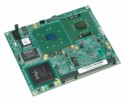ETX SBC implements laptop-style ACPI
Feb 15, 2006 — by LinuxDevices Staff — from the LinuxDevices Archive — 7 views Ampro Computers has introduced a rugged ETX format SBC (single-board computer) module that offers full laptop-style ACPI 2.0 power management under Linux. The ETX 802 is based on a 1.4GHz Low Voltage Pentium M processor, and enables a new class of battery-powered embedded devices, according to the company.
Ampro Computers has introduced a rugged ETX format SBC (single-board computer) module that offers full laptop-style ACPI 2.0 power management under Linux. The ETX 802 is based on a 1.4GHz Low Voltage Pentium M processor, and enables a new class of battery-powered embedded devices, according to the company.
ETX SBC modules plug into custom baseboards that contain additional system functions and I/O connectors required by the specific application. The ETX specification defines a set of connectors, located on the bottom of modules, that implement various system and peripheral interface signals.
Ampro claims the ETX 802 is the first rugged ETX module to provide full laptop-style ACPI 2.0 power management support, including the S3 (suspend-to-RAM) and S4 (suspend-to-disk) states. Additionally, the module's AMI BIOS provides full support for wake-up devices including LAN, keyboard, mouse, power button, and PCI or SMBus activity, according to the company.
Other listed functions and specifications include:
- Processor options:
- 1.4GHz Low Voltage Pentium M 738 (Dothan)
- 1.0GHz Ultra Low Voltage Celeron M 373 (Dothan)
- 600MHz Ultra Low Voltage Celeron M
- Chipset — Intel 855GME/ICH4M
- Memory — up to 1GB PC2700 DDR333 SODIMM
- Display — integrated Intel Extreme Graphics 2
- AGP 128-bit 3D engine
- resolution to 2048×1536
- up to 64MB UMA Frame Buffer
- dual channel LVDS flat panel support
- Storage:
- EIDE — dual PCI-bus enhanced Ultra DMA 33/66/100 synchronous IDE interface supports up to two hard drives
- Floppy — Supports 1 or 2 drives, shared with parallel
- Expansion — ISA and PCI busses
- I/O ports:
- Ethernet — Intel 82551QM 10/100 BaseT, wake on LAN
- 4 USB 2.0
- 2 asynchronous serial, TTL, transceivers on baseboard
- Audio — AC97 speaker, mic, headphone
- PS/2 keyboard and mouse
- Dimensions — ETX form-factor; 3.7 x 4.5 inches (95 x 114 mm)
The ETX 802 is resistant to shock and vibration, and offers a “unique in the industry” 3-year warranty on -40 to +85 degrees C operation, Ampro says. An optional conformal coating aimed at protecting against moisture and corrosion is also available.
Ampro competitor Kontron launched a Celeron-based ETX module in 2004 claimed to support an earlier version of the ACPI specification.
ACPI (advanced configuration and power interface) is an open industry specification for X86 systems co-developed by Hewlett-Packard, Intel, Microsoft, Phoenix, and Toshiba. It aims to allow “new power management technology to evolve independently in operating systems and hardware, while ensuring that they continue to work together,” according to ACPI.info, which recently published a third version of the specification. Linux support for ACPI is implemented by the API4Linux project.
Availability
RoHS-compliant production ETX 802 modules are expected to be available in April 2006, according to Ampro. Initial samples of non-RoHS ETX 802 modules are available for qualification in early March. Prices start at under $600 in “moderate quantities.”
Ampro offers development kits for the ETX 802 that include a “full Linux 2.6 distribution” based on Fedora Core 3, along with drivers and BSPs (board support packages) for Windows XP, Windows XP Embedded, Windows CE 5.0, VxWorks, and QNX.
This article was originally published on LinuxDevices.com and has been donated to the open source community by QuinStreet Inc. Please visit LinuxToday.com for up-to-date news and articles about Linux and open source.